“The Characters in the Play Are Wearing a Double Cockade.”
Zsolt Szász Talks to Director András Urbán
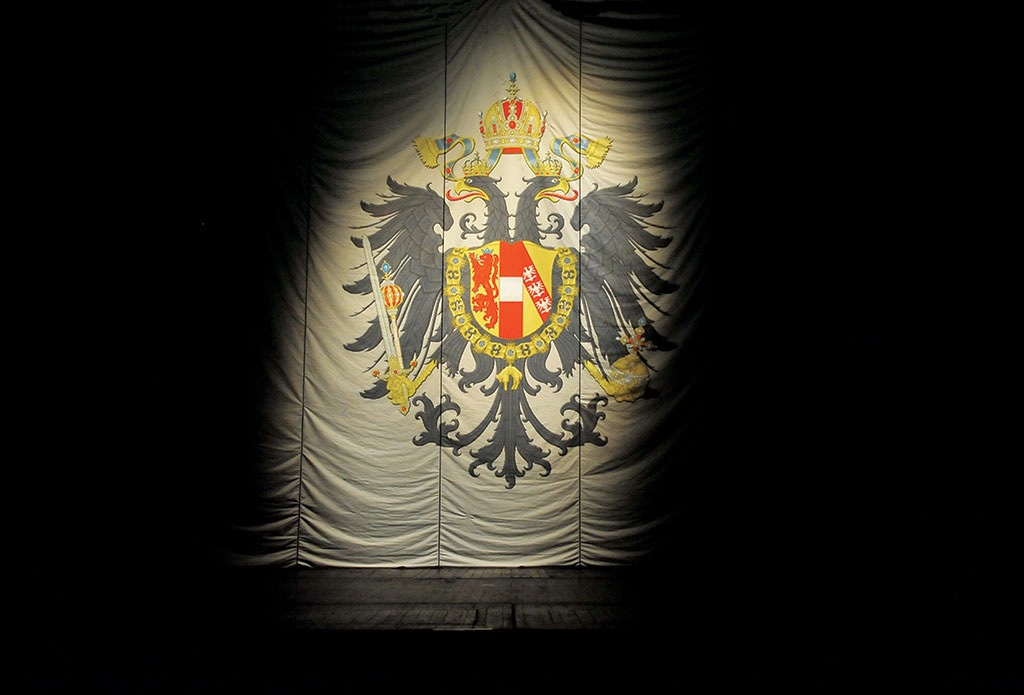
Zsolt Szász: “It does not happen very often that a minority Hungarian artist should stage a Serbian national classic and that this production should be presented at such an international theatre festival as MITEM, which is already in its third year now. I am especially happy about this since one of the central ideas of our festival from the very beginning is that the question of national identity must also be embraced by theatrical practice. Szcenárium devoted a two-day professional programme to this topic in 2014.[1] Recalling Eugenio Barba’s conceptions from 20–25 years ago, we discussed the question whether the theory on the all-time primacy of artistic identity over national identity and genius loci was still holding strong among theatre practitioners. As a pre-event to MITEM in 2015, a panel discussion took place at the Budapest Goethe Institute, where the guests from Austria and Germany approached this question from an entirely different point of view, that of the liberal concept of democracy. They formulated that the role which national theatres used to play in the creation of nation states in Europe had been eliminated. Contrary to that, it transpired at the forum – where, beside participants from Russia, France and Hungary, representatives of the newly formed national theatres in Macedonia and Algeria, two young democracies, took part – that this institution still had a decisive role to play in this region of Europe. This year’s MITEM is going to see a similar roundtable discussion in the topic, moderated, just like last year, by Ernő Verebes, whose home in Zenta, Serbia, is hosting our present conversation. Let me begin by saying that The Patriots in your direction became the production of the season at the Serbian National Theatre, Belgrade, last year. I take it as an indication of the responsiveness of the Serbian community, which has lived through a long period of war and has existed within the framework of a new state formation since 2006, to the findings you exposed them to. Reading the reviews, I have the impression that you managed to tear up emotionally a historic trauma which had been inhibited till then. Am I right? For about five years, your stagings have been characterised by this kind of clear-cut line: you reach for national topoi, taboos and major issues, as demonstrated by your choice of drama as well.”
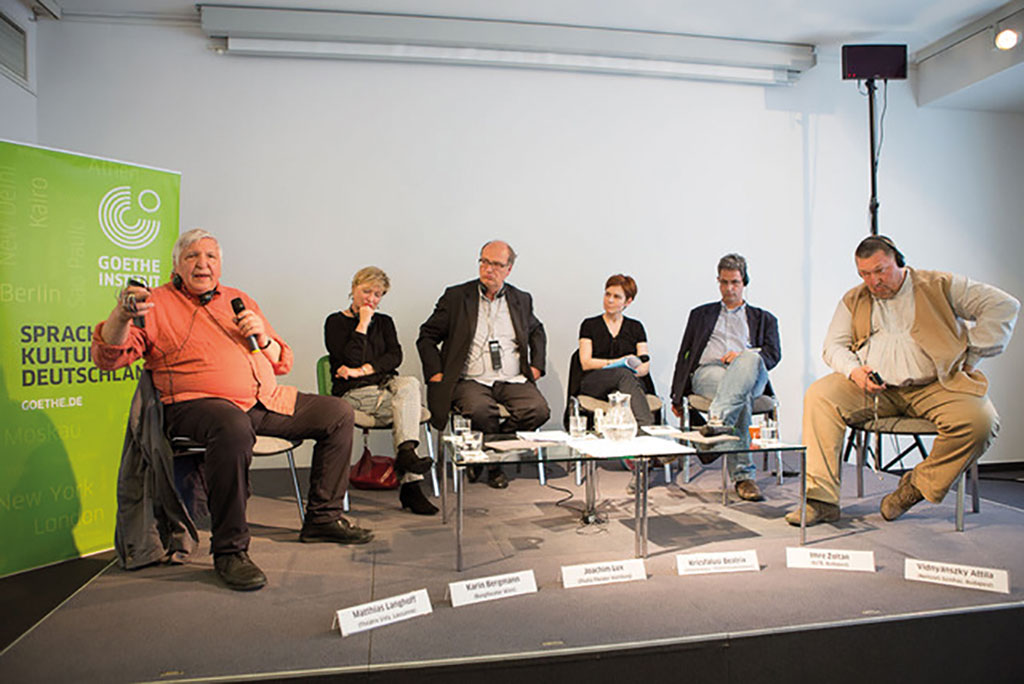
András Urbán: “I must set forth beforehand that in many cases it is not me but the theatres inviting me that select the play. However, it becomes indifferent from the moment I accept, because that is already my own decision. Obviously, it is no accident that I am invited to stage Serbian classics, that is to direct drama addressing questions of national or social identity. These requests often make me feel that the particular theatre would like to do something different, something out of the ordinary, and would welcome change. When I started dealing with these “grave” issues, I was primarily interested in the relationship between minority and majority. By the way, the problem often arises with regard to my person, too, that I, as a Hungarian, take a critical stance towards this country while, after all, I used to be a citizen of Yugoslavia before I turned into one of Serbia. This situation raises the question whether I do or do not have the right to criticize Serbian conditions, and it does not come from extreme nationalists only. In the majority society there is a continuous presence of a sort of anxiety, a drive to monitor, which is easy to discredit. It is a sensitive issue even if many people think that nationalism has become an unimportant and hackneyed topic. It is not so. It is a constant presence in our life, whether or not we deny it. Minority existence is certainly a special situation and although it need not be overestimated or put on a pedestal, it is a fact that it creates a specific identity and attitude towards the majority of a different nationality, and, for that matter, also towards ourselves, that is the Hungarian minority. I directed a trilogy entitled Pass-port[2], the second part of which, Maga az ördög (The Devil Itself), places exactly this Hungarian – Hungarian relationship under scrutiny. I am utterly preoccupied with this system of relations from every possible angle. The problem is that within political discourse it is very hard to get to essential contents which would involve some truth or a search for truth, instead of ideological battles in relation to ideological options. The liberal party will ignore certain topics because it assumes that they belong to the right wing. And vice versa. Neither is concerned with the other’s topics, saying they would be playing into the hands of the other one. Therefore truth is ground to dust in this discourse and the possibility of free speech annulled. However, it is indisputable that it is difficult to deny an existing language community. At the same time, belonging to a given language community does not necessarily entail commitment to a certain political ideology. In the case of Bánk bán (Ban Bánk) for instance, which I staged in Újvidék (Novi Sad) with the Hungarian company[3], there is a conservative concept of national theatre according to which one must feel it uplifting in connection with such a performance to belong to a particular national community. Whereas what I consider to be a true concept of national theatre would be dealing with the concrete problems in a given – not even necessarily national – community. Instead of taking part at a production, either as creator or audience, with the ambition of celebrating national tradition tailored to our social standing. Art is meant to be more. Situations and positions are never unequivocal in life. And art is intended, through its critical approach to reality, exactly to bring to light conflicts stemming from this fact.”
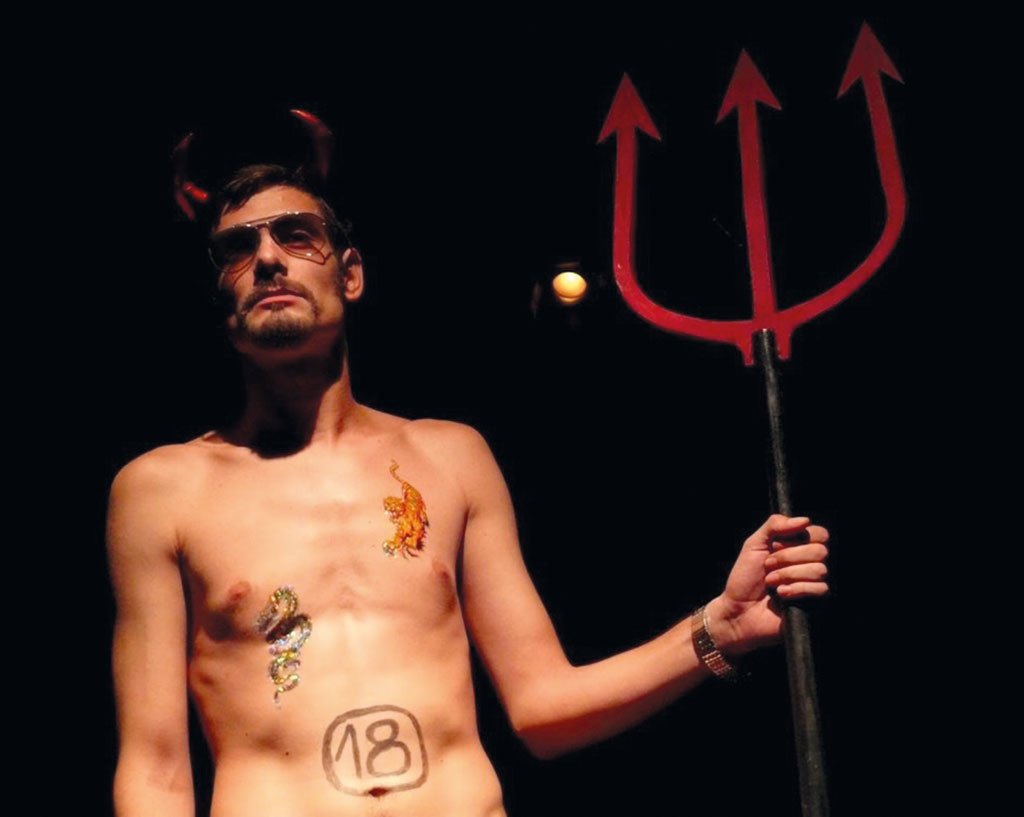
(Szeged, Hungary), 2012, d: András Urbán (photo: Róbert Révész, source: szinhaz.szeged.hu)
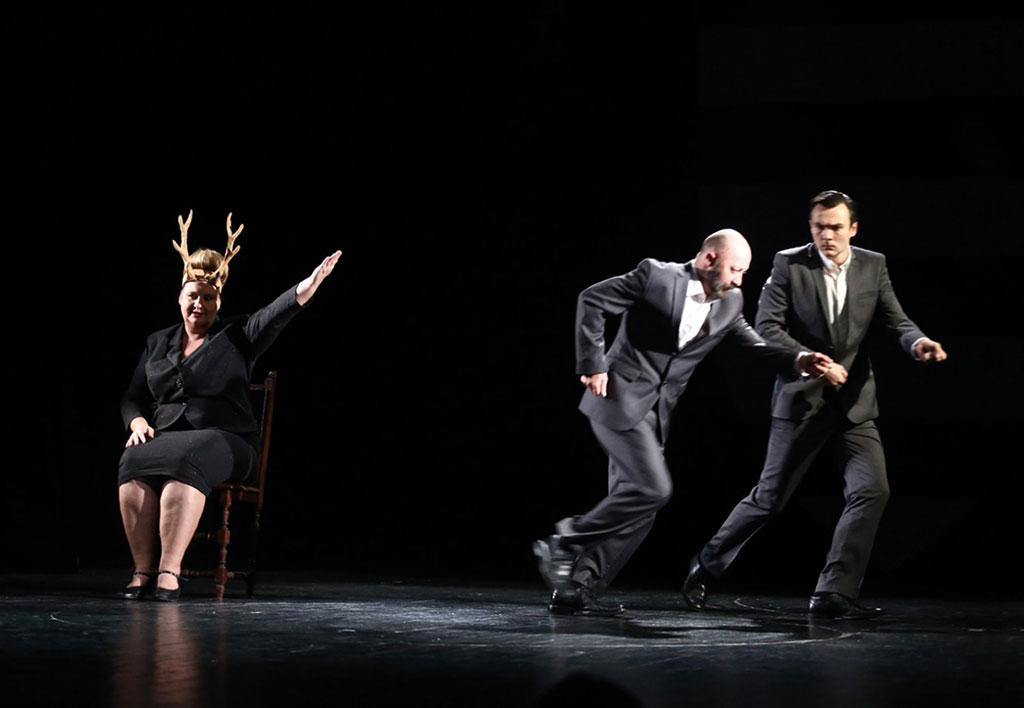
“You have just mentioned preferences represented by politics. Apparently, this is what meets the eye on the surface. However, if we examine more deeply the relationship between the Serbian and Hungarian nations, we will find that we have not reached the same stages in the creation, maintenance and renewal of the model of the nation state. This phase difference existed during the last century as well. Take for example Katona’s Bánk bán, which preceded The Patriots by more than three decades[4], with the author, Popović, even locking the piece for fifty years[5]. He might have done so because he did not presume that the Serbian community was mature enough yet to look at itself critically. In contrast, Bánk bán became emblematic the moment the nation awoke to self-awareness and the revolution broke out on 15th March 1848. This is one of the reasons why the piece is so difficult to reinterpret even in the 21st century. I wonder if you faced these questions in the course of staging the two classic plays?”
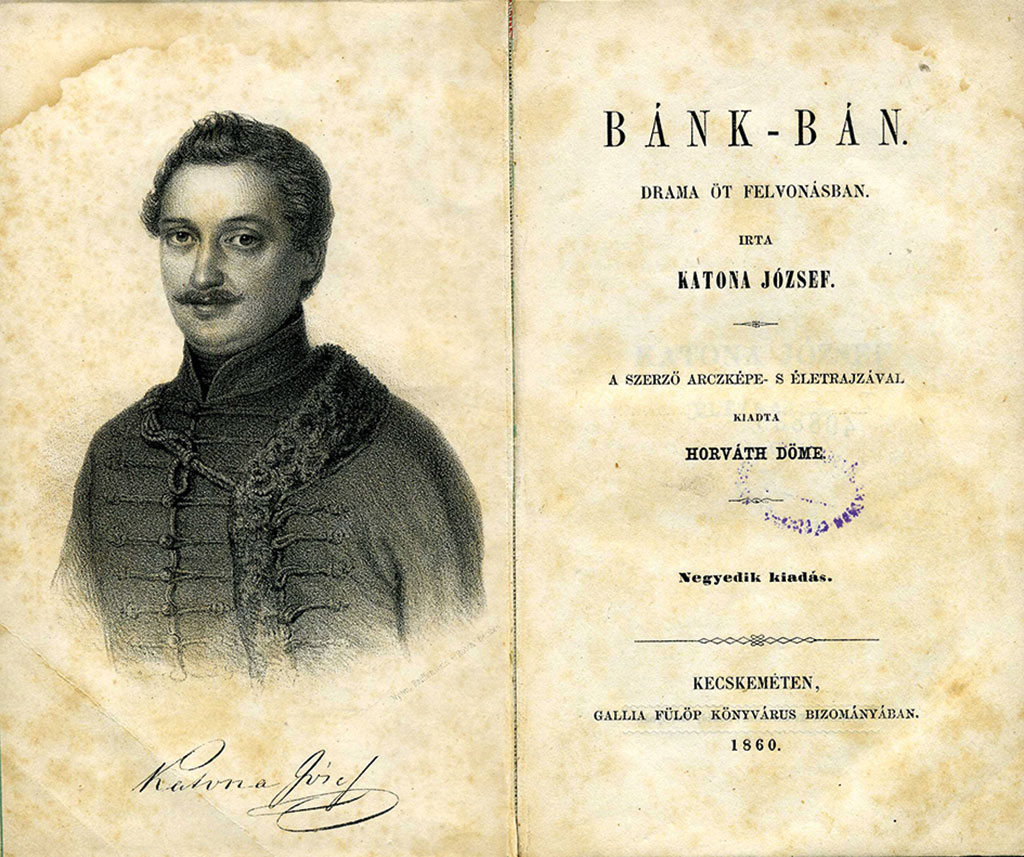
“All my experience is related to the region of former Yugoslavia. I am not really present in Hungary as a private individual, let alone a director – and I am not at all present at official theatres. Currently I am doing a lot more direction at Serbian and Croatian language theatres. It is not easy for me to define my artistic identity. Once I said jokingly that I was actually a Serbian director. The reception of The Patriots was interesting in this respect, too. You need to know that the author, Jovan Sterija Popović (1806–1856), counts as the great national “teacher of the people” in
Serbia[6]. This play of his is based on historical fact. It debunks the double-faced and hypocritical Serbian nationalism and depicts time-serving as a mentality based on sheer interests. Naturally, since it is a good play by a good playwright, it is not concerned with a particular nationalism but with various aspects of nationalism and fake patriotism, which are, I suppose, generally familiar phenomena everywhere, not only in Serbia. What really makes the piece interesting from our point of view is that the drama takes place in 1848, during the Hungarian revolution, in Vajdaság (Vojvodina). Here Serbs can define themselves only in relation to Hungarians. The characters in the play are wearing a double cockade: the Serbian one on top of the Hungarian, or the other way round, just as dictated by changing conditions. The mentality of “Preletači” in Serbian political life today is similar to this. Depending on the changing political power relations, these people go over even to the opponent from one day to another, as if they were only changing socks. And at the level of social judgement this is considered to be absolutely normal, or often even expectable or praiseworthy. However, it is equally typical of the highest echelons of the political elite, too. Not to mention that after any such instance of party-switching, these politicians give voice to ideologies which stand diametrically opposed to the ones they used to speak for so savagely just a little while ago. This sort of mentality characterised the war period and traumas of the 1990s, too, when the opposing parties were mutually killing each other. Losses were substantial on either side and there has been no end to accusations ever since, while neither nation wants to admit that it has committed genocide. Instead, it is trying to escape from this unacceptable position in order to restore its national self-image. Similarly, it finds it hard to confess that twenty years’ mistaken policies have led to this. It is obviously painful for the viewers when songs on the stage awaken the national feeling in them, only to be mocked at and deconstructed immediately. Still, the final response is going to be some sort of identification. Wisdom, however, may also be born in the audience so that it can see that too high a price had to be paid for our bigoted nationalism. Because people, even in Belgrade, are becoming aware of what kind of life they are forced to live day by day as a consequence.”
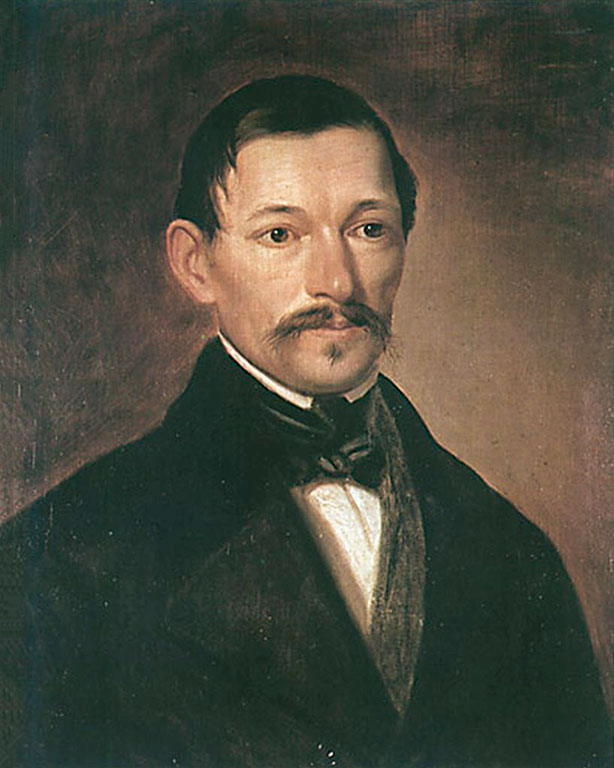
Serbian National Museum, Belgrade (source: newsweek.rs)
“Is The Patriots often played? Or is it a classic piece which has not yet been completely taken on?”
“Exactly. This play is rarely included in the repertoire, but sometimes it is brought back. It has been staged by great directors, too. However, it appears to be permanently on in the public mind. When we first started to discuss it with the actors, they said they had already played in very many similar productions. Then I suggested taking a look at the repertoires to see where exactly it was playing, or at least productions of similar subject were. And then it turned out that The Patriots had not at all been put on stage over the last five years. There are situations when something is present in the public consciousness not the way as it really is, in this case a lot of people, relying on their memories, have the sensation that this kind of critical attitude has been present on stages in Serbia, although this is not the case.”
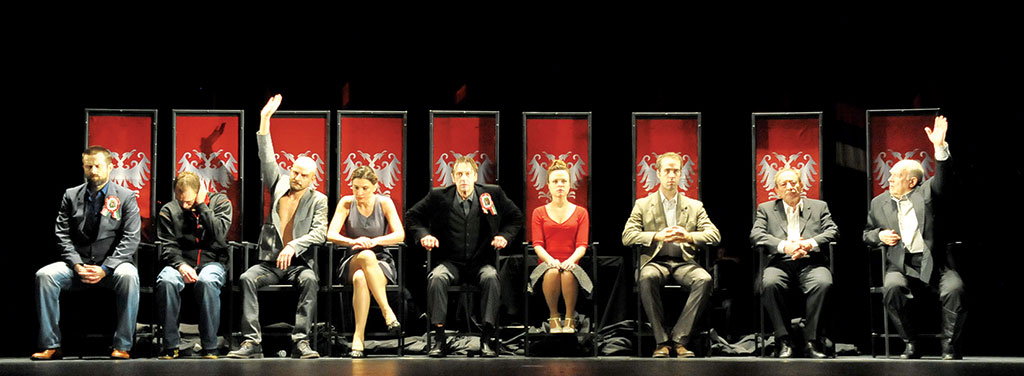
“This phenomenon is an example of myth formation concerning our relation to ourselves, to our national existence and character. One is often – or ab ovo, as it is in the nature of things? – characterised by a sort of double consciousness in this respect.”
“Here in Serbia, a kind of schizophrenic condition can be observed in this regard, which results in a most peculiar identity, too. While certain signs of the process of democratisation appear in public life, there is a general tendency of returning to and treasuring as well as building on traditional values. Even the EU accession process, for example, is typified by two souls. This was clearly visible not long ago when a politician announced a law amendment for instance by referring to constraint imposed by the EU, saying that although this was not good for us, it was demanded from us by the EU. In Serbia – just like elsewhere in the region – value preferences and behavior patterns which were never considered to be European earlier have been kept up under the table on an ongoing basis. I use the past tense because we have, unfortunately, learned by now that these stereotypes reckoned as anachronistic are in fact very European. Nevertheless, we are still looking on Europe as a utopistic bag where we pack everything that we consider good and positive about human rights and liberty. However, even main stream politics itself has kept non-European contents alive in this country despite the fact that we have admittedly been travelling along the European road for ten years. So we must draw the conclusion that we have had a different idea of Europe from what it is really like.”
“The satirical vision characteristic of Popovic is not unique on the Balkans. Ion Luca Caragiale (1852–1912)[7]7, the Romanian national classic playwright, also has a critical attitude toward the aping of Western bourgeois mentality, which only brings out even more the clumsiness, resulting from belatedness and provincialism, of this new-found democracy. Another striking parallel is that he only got canonised as a great national author after World War II, when the communist regime could take advantage of his comedies to discredit the civil establishment. It is also an interesting question whether this self-flagellant attitude has any continuation in contemporary drama when the situation in Europe is no less contradictory than it was some hundred and fifty years ago. Or is it rather the contemporary stage adaptations of classic authors only where this attitude is present?”
“In my case the fact that I, who deal with these issues, am a Hungarian stage director is only icing on the cake. It further enhances the significance of these contradictions. If I were not Hungarian, the Serbian right-wing would presumably feel different about the very same staging of mine – but I cannot judge it. A critic siding with the production wrote that I had already criticised Hungarian chauvinism, too, thus wishing to prove that I had the right to do so with respect to the Serbs as well. When it is exactly the other way round, with my activity basically being related to Serbian theatres – therefore I more often put what are regarded as Serbian classics on stage. As a citizen and tax-payer of Serbia, I have precisely the same right to deal with these issues as anyone of the majority nation. As for belonging to ethnic Hungarians, there is a reflex that one must huddle up and mind one’s own business. But what will happen if the choice happens to fall on a national classic, incidentally Bánk bán, at the ethnic Hungarians’ theatre in Újvidék? Its interpretation, similarly to that of works on the compulsory reading list anyway, usually gets trapped in the world of clichés. I always feel that we relate to these works, which are most valuable from the ethnic dimension, as if they were insignificant. Although we declare them to be significant, on the other hand we pretend they have never had anything to say. The subjects raised by them are treated on a gross and commercial basis and it is not asked why they have still become so important. These pieces are, in fact, all about something: they had something to say about man in their time, about the particular age and situation, and that is why we are touched by them even today. It was interesting in the case of The Patriots that the production was not attacked by the press on either political side. Yet it has the full list of today’s Serbian government. The press failed to react to this, but the audience did react. It is interesting, too, that one of the right-wing papers praised the play while distancing itself from me. At the same time, it felt the need of whitewashing the playwright. It said, for example, that Sterija Popović had gone overboard but he was not to be denounced for it, being the greatest playwright in Serbia and, as such, a national treasure.”
“Nowadays postdramatic theorists, with Hans-Thies Lehmann among them, have been continuously problematising the gap between the dramatic text of canonised classics and the texture as well as the changed social function of contemporary theatre.[8] And some go so far as to say that theatre does not actually need literary texts today. When, if you come to think of it, the initiator and fulfiller of the European rise of the middle classes – despite lost revolutions – was the idea of a nation based on literary language. And this is what still holds us together as nation states today.”
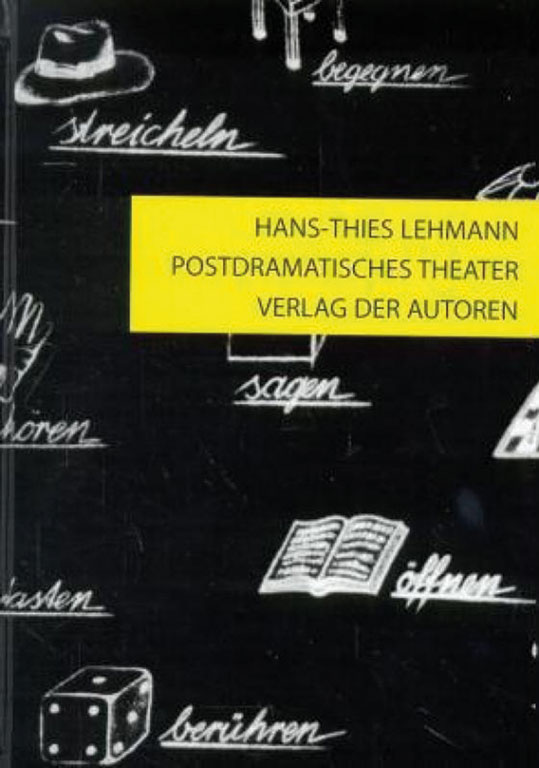
“Those who have an aversion to the language of contemporary theatre usually use the phrase that they would like to see and hear genuine Shakespeare on the stage. But what do they mean by that? Not the 16th – 17th century Shakespearen theatre, but usually the diction of the middle class theatrical tradition at the end of the 19th century. Text in the theatre is not a political question but an aesthetic one. And in this respect it is difficult for conservative theatres to see that expectations of them do not in fact count. Or they do only inasmuch as these expectations ought to be regarded as a kind of a target. Since these clichés, prejudices and commonplaces are right there in the audience’s consciousness, too. Thus the stage director is offered the possibility of a common platform where dialogue may commence. However, theatre is theatre. It must be concerned with a given problem in our-present day life, even independently of the literary text. My conversations with modern dramaturges always boil down to that the context at the theatres of the Balkan region is not literary, like in Hungary or in Central Europe generally, but rather connected to the reality of the present. I think that theatre does not in general communicate within a literary sytem but with reality itself. I do not merely mean the written word here, but the entire set which literariness embraces and which mostly encroaches upon theatre itself as well. Many times, national theatres, which function as folk theatre here, cannot rid themselves of this very literariness. And that is the main reason why they remain provincial.”
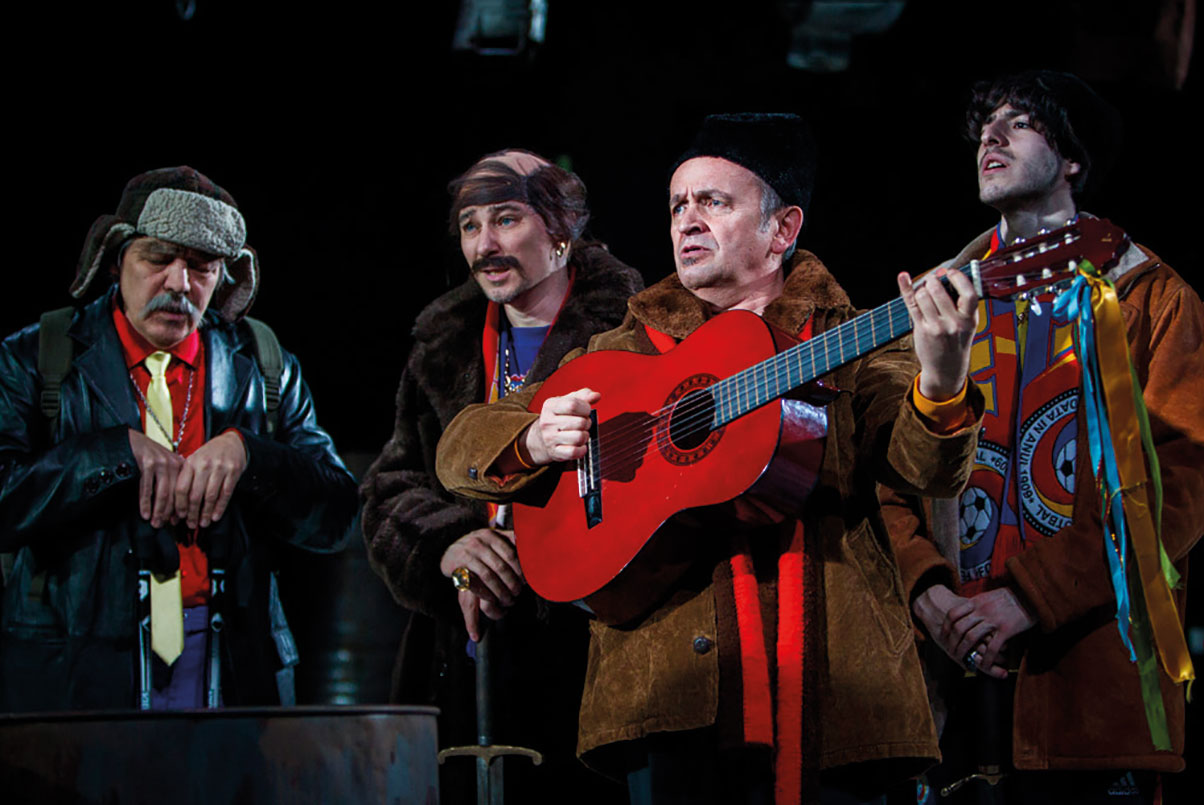
“Today many people think that it is no longer possible to write historical drama. However, it was POSZT last year which could see the appearance of contemporary playwright Csaba Székely’s piece, Vitéz Mihály (Michael the Brave)[9]9, which challenges age-old taboos in the direction of both Hungarians and Romanians concerning the immaculate Székelys and Vitéz Mihály, who was made to look like a ruler of European stature. This production, directed by Attila Béres, besides being eminently faithful to historical facts, conquers the audience by depicting, and mounting one on top of the other, the chaotic state of the world then and now through today’s deteriorated language, which, at the same time, is the source of murderous humour: it is capable of a simultaneous caricature of bloody gothic drama, tragicomedy and historical figures, in, for example, representing the mass murderer Major-General Basta as a superhero action-movie star. Are there any similar works in contemporary Serbian dramatic literature?”
“There is a public belief in Serbian intellectual life that this community is able to take a self-critical stance. And although Serbian productions trying very seriously to do away with illusions and face recent events do appear on and off, I would not say that it is typical. When plays like that have entered the public consciousness they will reinforce the image that it is a free and democratic society, but this mentality still fails to take permanent hold in our reality.”
“Your staging in Újvidék of Neoplanta[10]10, where the characters have been referring to particular historical events that have occurred from the refoundation of the town up to the present days, but in a manner as if the events of the distant past were their own personal experience just as the incomprehensible traumas of the recent past are, is most interesting from this point of view. That is why we feel that this production is, in a certain sense, a documentary drama.”
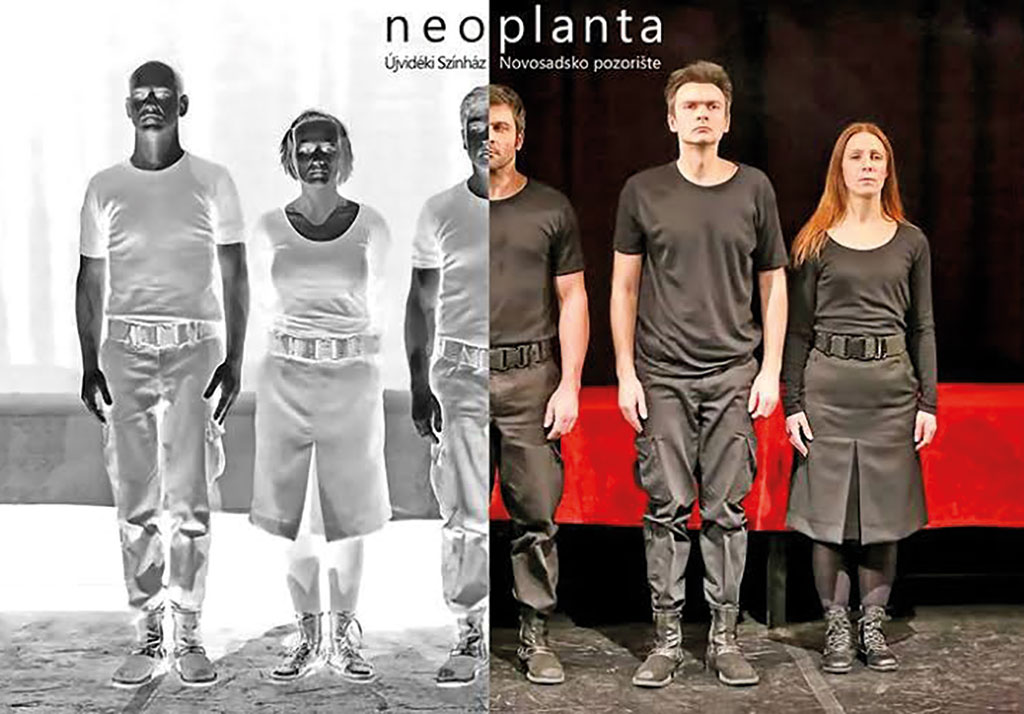
Újvidéki Színház / The Novi Sad Theatre, 2014 (source: litera.hu)
“This performance, however, is a confrontation actually, a kind of utopian image of coexistence. While it enumerates facts which are problematic for each nationality – either the Serbian, German or Hungarian. In this region of former Yugoslavia, the clarification of wars related to the disintegration of the federation is still going on. The great deed in connection with that would be if the nations living in this region could account for their own guilt, as has already been mentioned above. But it is difficult also because the victims continue to be traded in political diplomacy, as if they were a kind of currency. That is why no nation can achieve the moment of realistic discontinuity, from which we could move on, in fact, the diametrical opposite is happening. In this production I go to the limits in the staging of political themes. But I must state that as a theater-maker I am not engaged in political activism like those who, referring to Lehmann’s theory, cross this border over and over again - although I respect their work. As for documentarism, there has been a lot of abuse, such as when a particular company is talking about their own experiences on the stage. It does not matter, of course, whether something has really happened so or you have just made it up, which is what writers also often get picked on for. It does not determine whether something will make theatre or not. The problem is that this kind of operation develops its own clichés, too. Just like in the case of stone theatre, which is often recognised as theatre only because we have got used to behaving properly in one. But actually we do not know who needs it or for what. More often than not it does not transpire what a particular production has been created for. In this case the question arises whether there is still a social function attached to theatre other than people going to the theatre because they have been socialized to do so. This will not make art of theatre.”
“Being born in 1970, you were ten when Tito died. And twenty-two when the war broke out in 1992. We know that over the past quarter century the Hungarian population in the Délvidék has halved. As a result, the recipient milieu and the institutional system in which you are making theatre has substantially transformed. The age range of the audience has changed as well.”
“This is a very painful situation and you do not think of it every moment. I talk a lot with the actors during the rehearsal process about whether they still have some kind of a vision for the future. Because I cannot decide whether this concept has ceased to exist socially or historically, or it has just ceased to carry any significance to me, with the progress of biological time. It is possible that now we are living in a period when there is really no vision for the future, except perhaps in political discourse. For everyday people, even if they are well-off, life and everything related to the future have become unstable, especially since the economic crisis. We have no single tangible concept of what the future will hold. If we come to think of it, the situation is even more serious from a minority point of view. The other day I was talking to a local journalist in Zombor and he said that no Hungarian class would be launched in the city’s schools next year. And I still think of Zombor as a Hungarian town, while I have to realise that this has been unjustified for decades of course. Or take Szabadka (Subotica), where we are conceptualizing a theatrical educational programme, even though we are aware that the majority of today’s secondary school students will no longer be in the country in four years’ time. So we are experimenting to educate an audience of them in vain. When I, as a director, am recruiting new colleagues, it seems to me that only those have remained who fail to come up to the mark elsewhere, or have very serious sentimental or private reasons to stay here. And not only Hungarian but also Serbian young people are leaving the country one after the other. This has been an ongoing trend since the very beginning of the nineties. The people who have represented intellectual life for us are disappeearing, too. And with this, the specific quality of life which defined our daily lives is also changing.”
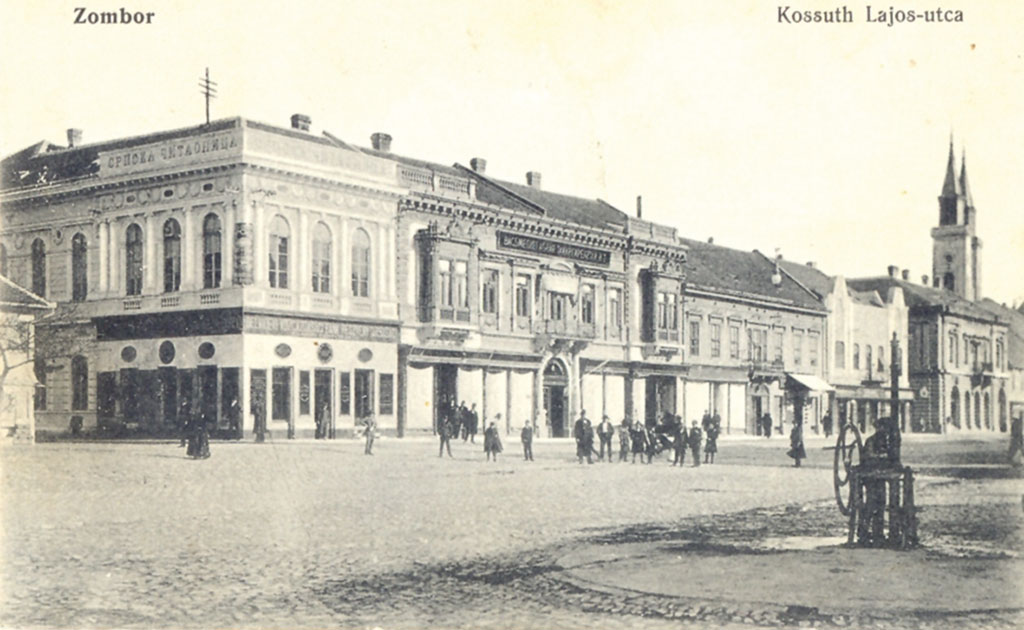
“Still, as we are talking, I do not feel that you are bitter. But coarse and, if you like, provocative I would say, having seen your productions. Is this your reaction to what you are experiencing in the world around you? Or is it what constitutionally fits you? Or is it what also appeals to the Serbian audience in your stagings? As well as the theatres that find you?”
“I do not know, but I have been socialized this way from the beginning. Perhaps I could compare my language to rock and roll or alternative music. Anyway, do not think that a theatre-maker should be over-subtle. After all, this is basically a harsh and boisterous art. And just as outspoken as poetry: it utters what hurts, what is clean and it causes pain so that we may be purified by it. But what makes me think that we must be tough? It is my conviction that one is not able to escape individual responsibility, not even when it comes to the election of leaders for example. After all, the Milosevic-es and Tudjmana-s never elected themselves and nor did a voting machine with a collective consciousness elect them, but it was responsible individuals, citizens in their own right who did so. Otherwise, I have never been concerned with why I am just the way I am. But I have always wondered why I am rejected by a section of the audience. Then I realized that they cannot forgive me that, at a certain moment, they are made to lose their feeling of comfort and do not know how to react. And I do not mean interactivity now, but the appearance on the stage of contents which the audience cannot make sense of, to which they have no socially sanctioned code. It is not that they do not understand something, but that they do not know how to behave in a given situation. Take, for instance, what happened in the case of Bánk bán at POSzT last year. At the end of the performance (but still as part of it) the question was asked of the audience what event would have to occur in the future Hungary (or in the country where we would be playing) for them to decide to leave the country. The prominent representatives of the right wing protested against posing this question and left the room shouting to the effect that this had nothing to do with Katona’s drama. When I think it is a most intimate question which we all ask ourselves, and which can naturally be answered by saying that under no circumstances are we going to leave our country. So what kind of castration anxiety may be at the root of the belief that this subject is not to be broached even in such a playful form, while emigration from Hungary and Vojvodina has been on the rise? What is anyone hoping to gain by daring to restrict truthfulness on stage on ideological grounds? While the extent to which political public life has become shameless and brutal around us is such as today a public figure feels free to undertake and casually say something which formerly used to be a concept or strategy under the table only, but which apparently no one needs to be ashamed of at present...”
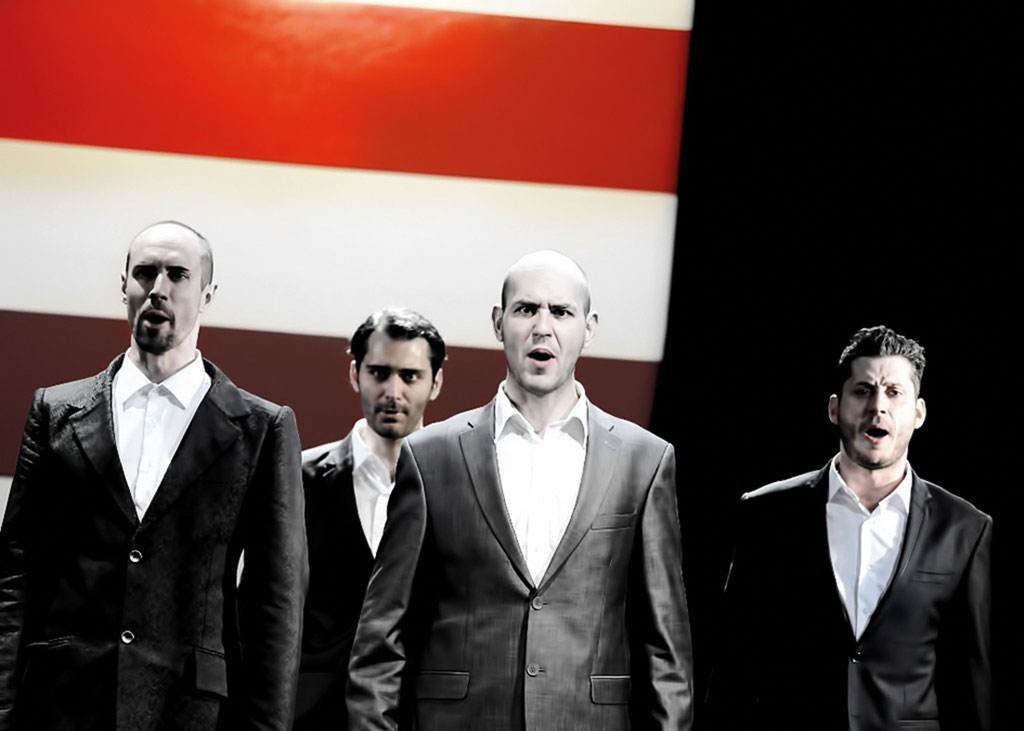
“The Characters in the Play Are Wearing a Double Cockade.”
Zsolt Szász Talks to Director András Urbán
The Patriots directed by András Urbán (b. 1970) became the production of the season at the Serbian National Theatre, Belgrade, last year, while his provocative stage interpretation of József Katona’s Bánk bán was a success at the latest POSZT (Pécs National Theatre Festival). The managing editor of Szcenárium talked to the director apropos of the presentation of the former work at this year’s MITEM. Attempts by the participants at the two previous festivals to reformulate the question of the nature of national identity in a manner valid for the 21th century are brought to mind in the introduction. It is highlighted that last year also saw a forum with the participation of, beside theatre professionals from Russia, France and Hungary, representatives of the newly formed national theatres in Macedonia and Algeria, two young democracies. It transpired at the roundtable discussion that the institution of national theatre had a decisive role to play in this region of Europe even today. András Urbán and Zsolt Szász discuss the question whether what responsibility theatre and, within that, those national classics who, like the author of The Patriots, Jovan Sterija Popović (1806–1856), determine to this very day the self-image and national consciousness of the Serbs, have in the process of the democratisation of Serbian society in the war-stricken Balkans, where young nation states came into being after the disintegration of Yugoslavia. From several angles, András Urbán throws light on his conviction that as an ethnic Hungarian, who also takes on a Serbian identity as an artist, he must approach drama in an unconventional way, liberating it from the well-worn clichés of 19th century nationalism, and explore its intrinsic values, including also the critical attitude they had to reflect upon their own time. As one among the professional materials focussing on MITEM, the full English version of the interview will be published in the April issue of Szcenárium.
[1] See the description of the programme entitled Identitás – szakralitás – teatralitás (Identity – Sacrality – Theatrality) in Hungarian and English in Szcenárium, March 2014, pp. 73–77. Related articles: Schola Teatru Węgajty, presentation by Johann Wolfgang Niklaus and Małgorzata Dżigadlo Niklaus in Szcenárium, April 2014, pp. 23–26.; Pálfi, Ágnes – Szász, Zsolt: Önazonosság és művész-lét (Self-Identity and Being an Artist), Ibid., pp. 14–22; Szász, Zsolt: Genius loci (Genius Loci), Ibid., pp. 27–33.
[2] The three productions were realised within the framework of Magyarország–Szerbia IPA, Határon Átnyúló Együttműködés (Hungary–Serbia IPA Cross-Border Co-operation) programme, with the co-operation of Kosztolányi Dezső Színház (Dezső Kosztolányi Theatre) in Szabadka (Subotica), Serbia, and MASZK Egyesület (MASZK Association) in Szeged, Hungary, in 2011/12.
[3] It premiered on 25th November 2014. See Katalin Keserü’s review entitled POSzT 2015 of the award-winning performance in Szcenárium, October 2015, pp. 91–92.
[4] Katona submitted the first version of the play to a drama competition by Erdélyi Múzeum, a literary periodical, in September 1815 and won no award. The final version was completed in 1819 and appeared in print in 1820. It was first staged in Kassa (now Kosice, Slovakia), in 1833. The drama premiered in full on 23rd March 1848 at Pesti Magyar Színház (Pest Magyar Theatre) after an interrupted premiere on the day the Revolution broke out on 15th March 1848.
[5] It was only fifty years after its publication that the piece premiered at the Serbian National Theatre on 30th December 1904.
[6] Jovan Sterija Popović (1806–1856) was instrumental in founding the Serbian Academy of Sciences as well as the first Serbian-language theatre in Belgrade among other things.
[7] The author’s latest appearance at the Nemzeti Színház was by the comedy Stormy Night (Zűrzavaros éjszaka), directed by István K. Szabó (premiere: 13th October 2013). The first MITEM in 2014 saw the play Two Lottery Tickets (Két sorsjegy), adapted from Caragiale’s short story, directed by Alexandru Dabija, performed by I. L. Caragiale National Theatre, Bucharest.
[8] Hans-Thies Lehmann’s (b. 1944) theoretical work, Postdramatic Theatre (Postdramatisches Theater), was published in German in 1999 and in Hungarian in 2009 (Posztdramatikus színház, Balassi Kiadó).
[9] The protagonist of the production received an award at POSzT in 2015. See review by Katalin Keserü: POSzT 2015, Szcenárium, October 2015, pp. 92–94.
[10] The production was adapted from László Végel’s novel of the same title at the Hungarian-language Novi Sad Theatre.
(15 April 2016)

